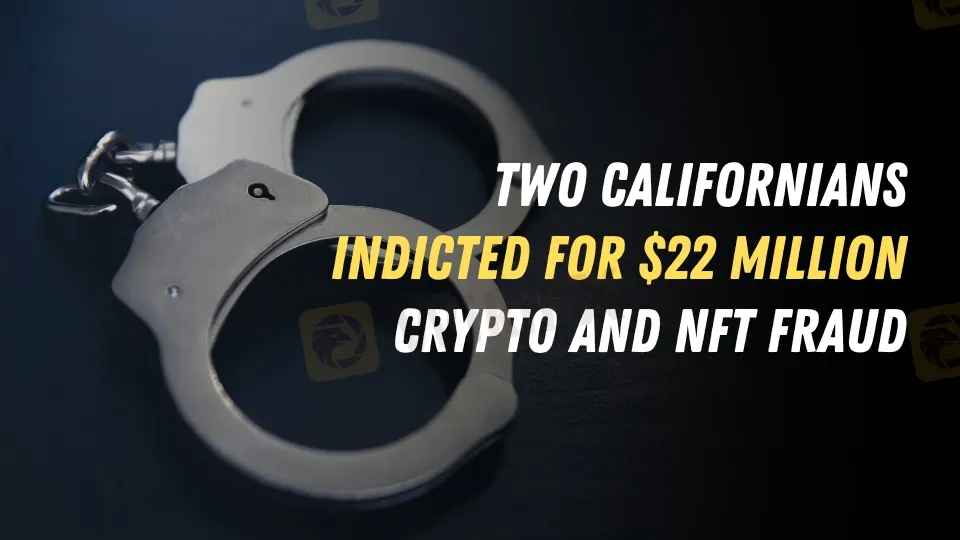简体中文
繁體中文
English
Pусский
日本語
ภาษาไทย
Tiếng Việt
Bahasa Indonesia
Español
हिन्दी
Filippiiniläinen
Français
Deutsch
Português
Türkçe
한국어
العربية
Two Californians Indicted for $22 Million Crypto and NFT Fraud
Abstract:Gabriel Hay & Gavin Mayo indicted for $22M crypto fraud. Learn about the Vault of Gems scam and how to avoid NFT rug pull schemes.

Authorities have indicted two Southern California men for allegedly defrauding investors out of over $22 million in cryptocurrency schemes. Gabriel Hay, 23, of Beverly Hills, and Gavin Mayo, 23, of Thousand Oaks, are accused of orchestrating a series of fraudulent projects involving nonfungible tokens (NFTs) and digital assets, according to federal prosecutors.
How the Alleged Crypto Scam Unfolded
Prosecutors allege that between May 2021 and May 2024, Hay and Mayo, along with an unnamed co-conspirator, operated multiple “rug pull” schemes. In these schemes, they collected substantial funds from investors before abandoning the projects, keeping the money for personal use.
One such project, Vault of Gems, was promoted as the first NFT “pegged to a hard asset.” The duo falsely claimed partnerships with jewelers and the development of an exclusive exchange for jewelry retailers. Despite their promises, the project was abandoned, leaving investors frustrated and defrauded.
Digital Assets and Fraudulent Activities
Cryptocurrency, a decentralized form of digital money, has gained immense popularity. Major cryptocurrencies like Bitcoin, Ethereum, and Solana offer investment opportunities, but they also attract scammers. NFTs, unique digital assets used as proof of ownership, have become a prime target for fraudsters.

Hay and Mayo allegedly used these digital tools to their advantage, transferring funds from their projects into personal wallets. Their fraudulent ventures included names like Faceless, Sinful Souls, Clout Coin, Dirty Dogs, Uncovered, MoonPortal, Squiggles, and Roost Coin.
Legal Actions and Charges
The U.S. Department of Justice is cracking down on such schemes. Principal Deputy Assistant Attorney General Nicole Argentieri stated, “Fraudsters take advantage of new technologies and financial products to steal investors hard-earned money.”
Hay and Mayo now face one count of conspiracy to commit wire fraud, two counts of wire fraud, and one count of stalking. If convicted, they could face up to 20 years in prison for each conspiracy and wire fraud charge, plus an additional five years for the stalking charge.
Harassment Allegations
In a separate charge, prosecutors allege that Hay and Mayo harassed a project manager who revealed their connection to fraudulent projects. The indictment claims they sent threatening messages to the manager and his family, posing as lawyers and investors. The threats escalated to false accusations and harassment through social media, demonstrating the lengths the accused went to silence whistleblowers.
Final Thoughts
The indictment of Gabriel Hay and Gavin Mayo serves as a stark reminder of the risks associated with cryptocurrency and NFT investments. While these digital assets hold great promise, they also provide a fertile ground for scams. Investors should conduct thorough research, verify the legitimacy of projects, and remain vigilant against red flags like unrealistic claims and lack of transparency.
As authorities crack down on fraudulent activities, the hope is that stricter enforcement and increased awareness will protect investors from similar schemes in the future.

Disclaimer:
The views in this article only represent the author's personal views, and do not constitute investment advice on this platform. This platform does not guarantee the accuracy, completeness and timeliness of the information in the article, and will not be liable for any loss caused by the use of or reliance on the information in the article.
Read more

Breaking News: OmegaPro Caught in a $650 Million Forex and Crypto Investment Scam
An indictment was leveled against two men in the District of Puerto Rico for their alleged involvement in the operation and promotion of OmegaPro, an international investment scheme that has led to financial losses worth over $650 million for investors. Check more about this story

5 Reasons: Microtrade Is a Red Alert
Is MicroTrade a scam or is it safe? This is a common question for many who are looking to invest or trade. Check out this article and you’ll see it is an investment scam

No License, No Security: CNMV Issues List of 10 Illegal Firms
Spain's financial watchdog, the National Securities Market Commission (Comisión Nacional del Mercado de Valores, CNMV), has issued warnings against 10 unlicensed forex brokers operating without proper authorization.

RM71,000 Lost in a Share Scheme That Never Existed
A 40-year-old engineer from Malaysia lost RM71,000 after falling for a fake investment scheme advertised on Facebook.
WikiFX Broker
Latest News
Global stock markets are calling Trump's bluff on tariffs
Trump's tariffs overshadow the pomp and pageantry as Macron meets King Charles
Boeing delivers most airplanes since late 2023 after ramping up 737 Max output
Inflation expectations drift back down to pre-tariff levels, New York Fed survey shows
MT4 vs MT5: A comprehensive comparison in terms of functionality
Top Forex Trading Strategies for the London Session
Swissquote Takes Full Control of Yuh Digital Finance App in Major Deal
Top 5 Forex Pairs Every Trader Should Have on Their Radar
What WikiFX Found When It Looked Into Decode Global
Treasury yields rise as Trump's new tariff rates in focus
Currency Calculator


